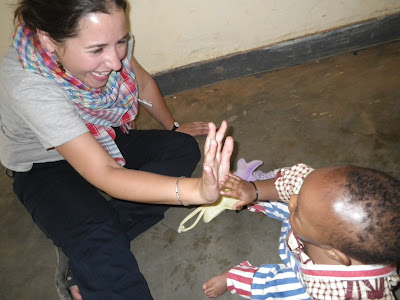Since I started Peace Corps I’ve had five “first day”‘s of work.
My first first day of work was in Philadelphia at staging, where the Peace Corps Washington facilitator sternly reminded everyone present that this was our “first day on the job” and we should be dressed accordingly. This made a lot of people wearing Birkenstocks, cargo pants, and t-shirts shift uncomfortably in their seats.
Next, I had my first day of work in Niger, where the customs agent at the airport asked me if I had come to Niger to find a husband. I laughed nervously: what had I gotten myself into?!
Three months later, I had my first day of work at site, where, much to my confusion and everyone else’s delight, two Nigerien men welcomed me with song and dance.
Barely a month after that, I had my first day of work in Rwanda. After over thirty hours of travel, I was introduced to all the Peace Corps Rwanda staff… none of which I remember.
And so, in March, five months after my first, first day of work, I had what I hope will be my last first day of work as a Peace Corps Volunteer.
The 7AM Health Clinic Staff Meeting started promptly at 7:10AM. For most of the meeting I had no idea what was going on. The Vice-Titulaire sat at a desk in the front of the room while the rest of us congregated on wooden benches. At one point, my supervisor wrote “Autopsie: verbale” on the blackboard board. I tried to turn my head discretely to see if anyone else in the room looked confused or alarmed, but apparently not.
Throughout the meeting a renewed sense of excitement came back to me.
My first few weeks in Niger I wrote in my journal time and time again: “I can’t believe I’m actually doing this!”. On tough days when I was sure another grain of sand in my eyes or teeth would drive me into insanity, I would look around and remind myself where I was, and what I was doing.
It’s been really difficult for me to get that feeling back since the evacuation. Between all the language lessons and the rush to get through training a second time, I’ve been generally exhausted and weary of getting too excited about being here… who’s to say I won’t be evacuated from Rwanda in three months?
But during that first hour of my first day at work in the health clinic the familiar feeling of enthusiasm, of energy pouring out of my body, came rushing back to me. I felt like I had come out of a slump. New ideas for activities and projects started pouring into my head faster than I could write them down. I watched my supervisor direct the staff and I think my jaw dropped as I observed my female co-workers loudly and authoritatively respond.
I spent the rest of the day shadowing various clinic employees, nodding and smiling at people who said lots of things I did not understand, and holding babies who didn’t cry when they saw me. This, my dear readers, is what I call living the dream.




